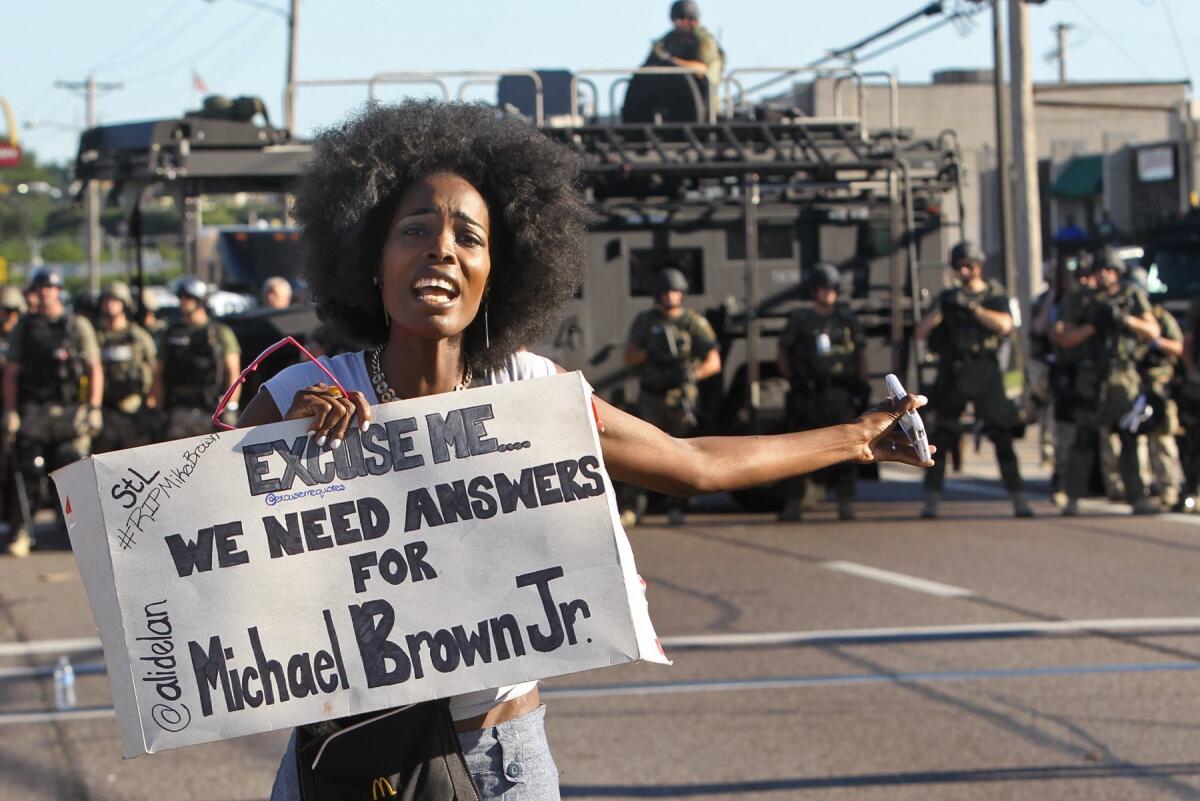Why are police bothering so many young black men in the first place?

- Share via
Have to hand it to Kentucky Republican Sen. Rand Paul. On Thursday, in an essay for Time magazine, he nailed one of the major problems with the police shooting of Michael Brown in Ferguson, Mo., and the unconscionably militarized police response:
“If I had been told to get out of the street as a teenager, there would have been a distinct possibility that I might have smarted off,” Paul wrote. “But, I wouldn’t have expected to be shot.”
As a libertarian, Paul blames “big government” for the disproportionality of the police response: “Washington has incentivized the militarization of local police precincts by using federal dollars to help municipal governments build what are essentially small armies — where police departments compete to acquire military gear that goes far beyond what most Americans think of as law enforcement.”
And that is certainly a part of the problem. When you are a hammer, as they say, every problem looks like a nail.
But Paul is also refreshingly realistic (for a Republican) about the deeper roots of the problem:
“Anyone who thinks that race does not still, even if inadvertently, skew the application of criminal justice in this country is just not paying close enough attention,” he wrote. “Our prisons are full of black and brown men and women who are serving inappropriately long and harsh sentences for nonviolent mistakes in their youth.”
Amen. This is a shameful American reality that must be addressed. The election of our first black president was an important step toward racial equality, but, as we have seen over and over since 2009, it was nothing more than a balm for wounds that are far too deep to be healed by the election of a single human being.
Many folks have pointed out the extraordinary double racial standard at play when the situation in Ferguson is juxtaposed with what went down last summer in southeastern Nevada.
A well-armed white rancher who owed the feds millions of dollars in grazing fees incited a pseudo-militia of gun-toting nutcases to consider violence against the federal government. Who can forget the images of Cliven Bundy and his lunatic supporters, lying like snipers on a freeway overpass, their automatic weapons pointed east — toward Washington, I guess — itching for the chance to open fire on the gummint?
What happened? Nothing. The government backed off, the crazies melted back into the desert, and conservatives strained to disavow Bundy after a reporter recorded him making blatantly racist remarks.
Now contrast that to what happened Saturday in Ferguson, when a recent high school graduate was walking in the street with a friend and was told by a police officer to get out of the street.
Or what happened Monday when Los Angeles police officers decided to stop a young man, later described as mentally ill, who was walking down the sidewalk and “made suspicious movements, including attempting to conceal his hands.”
Or what happened Tuesday when a pressman for the Victorville Daily Press was stopped by police as he was riding his bicycle because his doctor told him to lose weight or face the possibility of a heart attack or a stroke?
All of them ended up dead.
Michael Brown, 18, was shot and killed after what police have claimed was a struggle. Witnesses contradicted the police account.
Ezell Ford, 25, was shot and killed after what police say was a struggle. Witnesses contradicted the police account.
Dante Parker, 36, a father of five, died after San Bernardino County sheriff’s deputies tasered him during a struggle. They stopped him, they said, because they received a report of a man leaving a robbery on a bicycle. Apart from a drunk driving conviction in 1997, the Victorville Daily Press reported, Parker had no criminal record.
What else did these men have in common? All were unarmed. All were black.
On the radio Thursday morning, I heard an ex-cop and criminology expert explaining when it’s OK for an officer to use deadly force on a suspect. The guidelines seemed pretty straightforward.
But that’s not really the question we need to ask right now.
What we need to ask is why the police are bothering young black men in the first place?
Twitter: @robinabcarian
More to Read
Sign up for Essential California
The most important California stories and recommendations in your inbox every morning.
You may occasionally receive promotional content from the Los Angeles Times.











